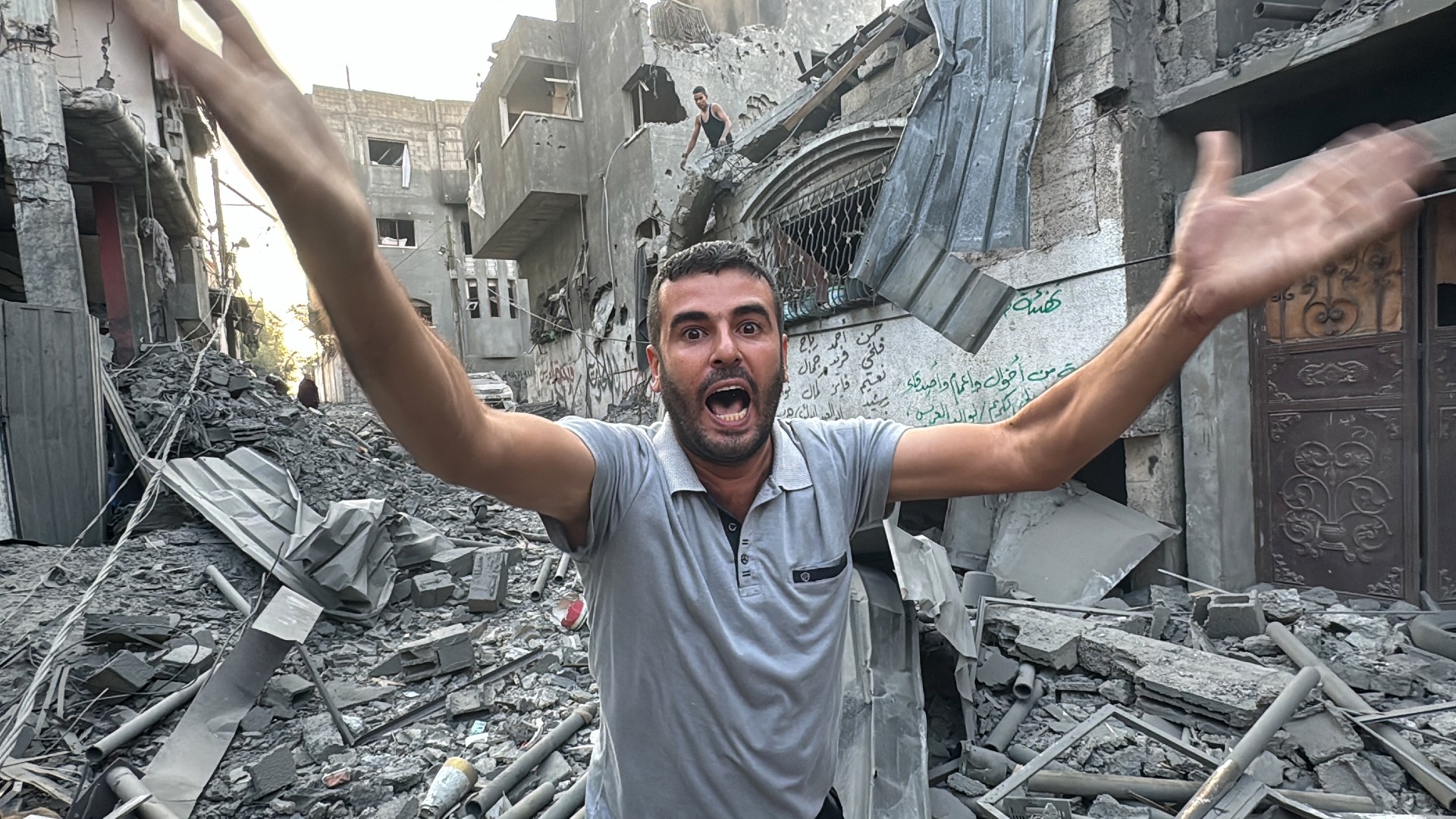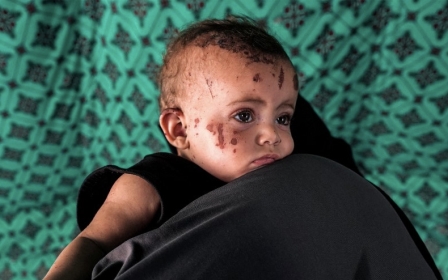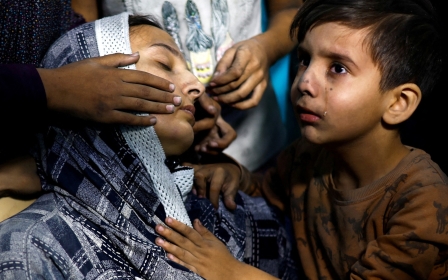Gaza doesn't care about Trump or Harris - only survival matters

I spoke to my family in Gaza a day before the US election. Our conversation followed days of silence, of unbearable waiting, with every hour deepening my dread.
When I finally heard my nephew’s voice, I felt relief, but it quickly gave way to heartbreak. At just 21, his voice now carries a sadness and exhaustion far beyond his years.
“Does it even matter who wins?” he asked me, his tone hollow and resigned. “[Donald] Trump or anyone else - it doesn’t matter. Will he end this war?”
His words cut through the phone line, reflecting a hopeless disbelief that anyone outside of Gaza may ever care enough to put an end to the horrors that Palestinians in the besieged enclave endure daily.
Then he added, almost to himself: “Maybe it’s better if Trump wins. At least he’ll end it one way or another. Either he’ll let Israel drop a bomb and finish us off, or he’ll force Israel to stop the killing. Either way … anything to end this pain.”
New MEE newsletter: Jerusalem Dispatch
Sign up to get the latest insights and analysis on Israel-Palestine, alongside Turkey Unpacked and other MEE newsletters
A hollow ache bloomed in my chest. I couldn’t believe what I was hearing - a young man, barely an adult, speaking as if annihilation were the only mercy left; as if the quickest path may be to end it all.
I struggled to keep my own voice steady, to hold back the trembling in my tone. I forced a smile, even though he couldn’t see it, and replied: “No, he’ll call for peace. He’ll have to stop this war. Things will get better. We’ll rebuild Gaza; you’ll see.”
Follow Middle East Eye's live coverage of the Israel-Palestine war
But he only went silent, and I could feel his disbelief. When he finally spoke, his voice was a mix of bitter disbelief and quiet despair.
“You say that because you can’t see it,” he said. “There’s too much destruction. But maybe … if they stop the killing, maybe we can rebuild. I don’t know. People here, they’re desperate. They just want it to end - at any price, any cost. The suffering is so much, the dreams here are only for the simplest things … a new pair of shoes. Do you know what that’s like?”
Spirit ground down
What could I say to that? A world away, living in comfort, I had nothing to offer but words. Yet the weight of his desperation - his raw, pleading honesty - rendered me silent. I could feel my own helplessness crashing in around me.
I tried to steer our conversation towards politics, something that might distract him or provide a shred of normalcy. But I soon realised that politics are a luxury the people of Gaza can no longer afford.
They don’t have time to debate, analyse or ponder strategies. Their only ideology left is survival: finding clean water, searching for bread, staying safe for another day. What matters to them is the next breath, not the next election. Their world has been reduced to the immediacy of daily survival.
The suffering in Gaza has reached an incomprehensible level. The Palestinian spirit, once unbreakable, has been worn thin, ground down by Israel’s relentless assaults.
People aren’t asking for victories or grand solutions any more; they just want an end to the pain, a moment to breathe without fear.
Some of my friends from Gaza still manage to post on social media. They know that Trump is close to Israeli Prime Minister Benjamin Netanyahu, and that US Vice President Kamala Harris has stood by Israel’s actions. But at this point, none of it matters. They don’t care who’s in power; they’re not looking for political alignment. They want someone, anyone, to end the genocide.
Darker truth
There’s a truth even darker than this. The world’s relentless indifference towards Gaza’s suffering has seeped so deeply into the psyche of its people that many have begun to wonder whether they’re cursed, or worse, if they somehow deserve this.
One friend told me recently: “Maybe we brought this on ourselves. Maybe it’s our fault.”
Can you imagine? People enduring unspeakable atrocities are beginning to believe this suffering is their punishment.
I want to believe in a future where my nephew no longer sees death as his only escape, but sees life as something precious, something worth living
I wanted to tell her it wasn’t true, that none of this was their fault. I wanted to shout it across the world so that no one in Gaza would ever believe they deserved this. But I understand her point. When you’re surrounded by pain, and the world turns a blind eye, you begin to think: “Maybe I’m the problem.” It’s a terrible, dark thought that has crept into the minds of too many people I love.
When I spoke with my nephew, I could feel the weight of this hopelessness bearing down on him. His words lingered in my mind long after we said goodbye.
The people of Gaza don’t ask for much any more. They’re not even asking for justice; they’ve moved past that. They just want an end to their agony. They just want their suffering to matter enough that it stops.
Geopolitical game
And now, Trump has won. The world has turned again, and a new American administration holds the reins.
The question echoes endlessly: will they end this suffering? Will they look beyond politics, beyond alliances, and recognise that Gaza’s people are more than pawns in a geopolitical game?
These are human lives - full of dreams that have been buried under the rubble, of hopes that have been crushed time and again.
I want to believe there’s hope; that maybe, just maybe, someone will finally see Gaza’s humanity and act to end this nightmare. I want to believe my family, and all the families of Gaza, will make it through.
I want to picture them walking through Gaza’s streets again one day - not as survivors of endless genocide, but as people who are allowed, at last, to live in peace.
But then I awaken, my heart pounding, reality striking like an electric shock. Trump is in power again - and still, I cling to something, anything, that may offer hope. I think of an old Arabic saying that comforts me in these darkest moments: “Sometimes, roses bloom from thorns.” Despite everything, I want to believe it. I have to believe it.
In the end, this is all I have - the fragile hope that one day, the people of Gaza will be free from this suffering; that their lives will mean more than the politics that have trapped them for so long.
I want to believe in a future where my nephew no longer sees death as his only escape, but sees life as something precious, something worth living. I hold onto this hope, believing that the world will awaken to Gaza’s suffering and finally say “enough”.
The views expressed in this article belong to the author and do not necessarily reflect the editorial policy of Middle East Eye.
Middle East Eye delivers independent and unrivalled coverage and analysis of the Middle East, North Africa and beyond. To learn more about republishing this content and the associated fees, please fill out this form. More about MEE can be found here.






